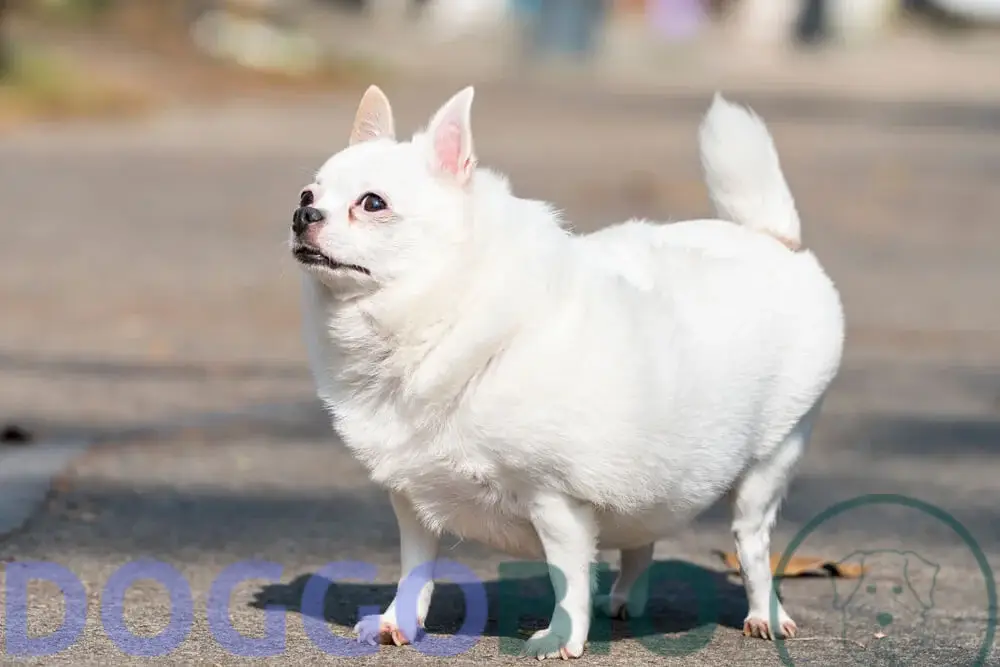When it comes to our beloved pets, particularly our pint-sized Chihuahuas, their health and well-being are paramount. A common concern among Chihuahua owners is the noticeable weight gain in their furry companions. “Is my Chihuahua too fat?” you might ask. The answer, though not always straightforward, is often a resounding “Yes.” This concern goes beyond mere aesthetics; it delves into the realm of dog health, specifically focusing on the implications of a ‘fat Chihuahua.’
In this article, we will explore the various factors contributing to weight gain in Chihuahuas, the health risks associated with obesity in dogs, and practical steps you can take to ensure your Chihuahua maintains a healthy weight. Remember, acknowledging the issue is the first step towards a healthier, happier pet.
Is My Chihuahua Too Fat?
Yes, Chihuahuas can be overweight or obese.
Chihuahuas, known for their small size and lively personality, are particularly susceptible to weight issues. Even a small amount of excess weight can significantly impact their health due to their petite stature. A few extra ounces can strain their bones and organs.
Obesity, which is an excessive form of weight gain, poses even greater risks, such as joint problems and heart diseases. Therefore, it’s crucial to recognize if your Chihuahua is carrying extra weight and take appropriate measures to maintain their health and well-being.
Is Your Chihuahua Overweight Due to a Health Reason?
Yes, your Chihuahua’s weight gain could be due to a health reason.
Many believe that pets gain weight only from overeating or inactivity, but a medical issue is sometimes the root cause.
Conditions like hypothyroidism, where the thyroid gland underproduces hormones, or Cushing’s disease, characterized by excessive cortisol production, can lead to weight gain even with a proper diet and exercise.
If you notice unexplained weight gain in your Chihuahua, seeking a veterinarian’s advice is vital. They can conduct tests, determine the cause, and guide you on the next steps.
Why Is My Chihuahua So Fat?
Chihuahuas, despite their small size, have a hearty appetite. They can easily be overfed, especially if given calorie-rich treats or human food. Their small size means they don’t require many calories, so even a tiny amount of extra food can lead to weight gain.
Like all dogs, Chihuahuas’ metabolism slows down as they age. This means they burn fewer calories and can gain weight even if their diet remains unchanged.
It’s also worth noting that some Chihuahuas might have a genetic predisposition to gain weight. Regular vet check-ups, a balanced diet, and adequate exercise are crucial to weight management.
How Can I tell If my Chihuahua is Too Fat?

1.Tires easily during activities:
Chihuahuas are naturally energetic and playful. It might carry extra weight if your Chihuahua gets exhausted quickly or shows reluctance to play. This reduced energy level can impact their overall well-being and happiness.
2.Struggles with self-grooming:
Chihuahuas take pride in their grooming. If they’re struggling to groom certain parts of their body or neglecting them altogether, it might be due to excess weight. This can lead to other complications like skin infections.
3.Difficulty in feeling the ribs:
The rib test is simple to check your Chihuahua’s weight at home. If you struggle to feel their ribs without pressing hard, it’s a sign of excess weight.
4.Absence of body definition:
A healthy Chihuahua should have a visible waistline. If your Chihuahua’s body appears more rounded or sausage-like, it’s a clear sign of being overweight.
Characteristics of a Healthy Chihuahua

1.Ideal weight and size.
Chihuahuas, depending on their specific breed type, can vary in weight. However, most adult Chihuahuas should weigh between 2 to 6 pounds. Regular vet visits can help ensure they’re within this range.
2.Physical appearance and attributes.
A healthy Chihuahua boasts a shiny coat, clear eyes, and an alert demeanor. Their skin should be free from dry patches, and their coat should be thick and vibrant.
3.Energy levels and behavior.
Chihuahuas are naturally curious and active. A healthy Chihuahua will be eager to play, explore, and engage with its surroundings. A sudden change in their behavior or energy levels should cause concern.
Causes of Obesity in Chihuahuas

1.Overfeeding and lack of portion control.
Feeding your Chihuahua more than daily caloric needs can lead to weight gain. It’s easy to overfeed these tiny dogs, especially with treats. It’s essential to understand their dietary needs and stick to them.
2.Lack of exercise.
Chihuahuas, despite their size, are active and need regular exercise. Without it, they can become sedentary and gain weight. Regular walks and play sessions help keep them active and fit.
3.Medical conditions leading to weight gain.
Health issues like hypothyroidism or side effects of certain medications can lead to weight gain, which is particularly pertinent for Chihuahuas, given their susceptibility to various health problems.
Regular vet check-ups can help catch these issues early, including common Chihuahua health issues, such as dental problems, patellar luxation, and heart conditions, and address them promptly.
4.Genetic predisposition.
Some Chihuahuas might be genetically predisposed to gain weight. Knowing your dog’s lineage and any weight issues in their ancestry can help you proactively manage their weight.
How Does Obesity Affect Chihuahuas?
Carrying excess weight can profoundly impact a Chihuahua’s health and quality of life. Their petite frames aren’t built to support extra weight, leading to many health problems.
From joint pain to respiratory issues, obesity can reduce a Chihuahua’s lifespan and daily quality of life. They might become less active, avoid play, and even develop behavioral problems due to discomfort or pain. Monitoring their weight and maintaining a healthy lifestyle is crucial for their well-being.
What Are The Health Risks Associated With A Fat Chihuahua?

1.Heart diseases.
Obesity can lead to heart problems in Chihuahuas. The heart must work harder to pump blood, leading to conditions like an enlarged heart or heart failure. Regular vet check-ups can help monitor their heart health.
2.Joint problems.
Extra weight strains a Chihuahua’s joints, leading to conditions like arthritis. This can be especially problematic for Chihuahuas, as they’re known to have joint issues. Providing joint supplements and ensuring they don’t jump from high surfaces can help protect their joints.
3.Diabetes.
Obesity is a significant risk factor for diabetes in dogs. Managing diabetes requires daily care, including insulin injections and special diets. Monitoring their weight can help prevent this condition.
4.High blood pressure or hypertension.
Increased blood pressure can lead to other complications like kidney disease or blindness. Regular vet check-ups can help monitor their blood pressure and ensure it’s within the normal range.
5.Difficulty breathing.
Chihuahuas already have small respiratory systems, and extra weight can exacerbate breathing problems, especially in hot or humid weather. Ensuring they’re not exposed to extreme temperatures and monitoring their breathing can help prevent respiratory issues.
6.Spinal issues.
Chihuahuas are prone to spinal problems, and extra weight can increase the risk of conditions like intervertebral disc disease. Providing orthopedic beds and ensuring they don’t jump from high surfaces can help protect their spine.
7.Back problems.
The added weight can strain their back, leading to pain and mobility issues. Regular massage sessions and providing them with a comfortable resting place can help alleviate back pain.
8.Pancreatitis.
This painful condition is more common in obese dogs and requires immediate medical attention. Feeding them a low-fat diet and ensuring they don’t consume fatty foods can help prevent this condition.
9.Reduced quality of life.
Beyond specific health issues, obesity can reduce a Chihuahua’s overall quality of life. They might avoid play, become more sedentary, and show signs of depression. Ensuring they lead an active and healthy lifestyle can improve their quality of life.
10.Shortened lifespan.
Numerous studies have shown that obese dogs live shorter lives than their fit counterparts. For Chihuahua owners, this means fewer years with their beloved pet. Monitoring their weight and ensuring they lead a healthy lifestyle can help extend their lifespan.
Behavioral and psychological effects:
1.Laziness.
An overweight Chihuahua might avoid play and prefer to lie around. This lack of activity can lead to further weight gain, creating a vicious cycle. Engaging them in interactive play sessions and providing them with toys can increase their activity levels.
2.Aggression due to discomfort.
Pain from joint issues or other obesity-related conditions can make a Chihuahua more irritable or aggressive. Providing them pain relief and addressing the root cause of their discomfort can help alleviate aggression.
3.Anxiety.
Changes in body shape, discomfort, and reduced activity can lead to anxiety in Chihuahuas. They might become clingy, bark more, or show other signs of stress.
Providing them with a comfortable environment and ensuring they have regular play sessions can help reduce anxiety.
How Can I Help A Fat Chihuahua Lose Weight?
1.Proper diet:
A specialized weight management dog food can help reduce calories while still providing all the necessary nutrients.
Measuring food portions and avoiding giving table scraps or too many treats is also essential. Consulting with a vet can help determine the best diet for your Chihuahua.
2.Exercise:
Regular walks, play sessions, and interactive toys can help increase your Chihuahua’s activity level. Even short, frequent walks can make a significant difference.
Engaging them in interactive games like fetch or tug-of-war can also help increase their activity levels.
3.Regular vet check-ups:
A vet can guide the ideal weight for your Chihuahua, recommend a diet, and monitor for any obesity-related health issues. Regular vet visits can help monitor their weight and ensure they’re on the right track.
Frequently Asked Questions
What Defines Obesity In A Chihuahua?
Obesity in Chihuahuas can be determined by comparing their weight to the ideal body weight for their size, age, and overall health. Utilizing a Chihuahua Growth Chart can provide valuable insights into whether your dog is within a healthy weight range.
Regular vet check-ups are essential for monitoring your Chihuahua’s size and weight, enabling early detection of obesity and implementation of appropriate interventions to ensure their well-being.
Are Chihuahuas Naturally Inclined To Gain Weight?
No, Chihuahuas are not naturally inclined to gain weight.
However, some may have a genetic predisposition. The primary determinants of their weight are lifestyle choices, including diet and activity level. To avoid weight gain, providing them with a balanced diet and ensuring they remain active is essential.
Why Do Some Chihuahuas Develop Fatty Necks?
This can be a sign of obesity or other health issues. Regular vet check-ups can help diagnose the cause and provide treatment options.
What To Do When Your Chihuahua Is Fat?
Start with a vet consultation to rule out any health issues. Then, focus on diet and exercise to help your Chihuahua shed the extra pounds. Providing them with interactive toys and engaging them in play sessions can also help increase their activity levels.
How To Make My Chihuahua Fat?
It’s not advisable to intentionally make your Chihuahua overweight. If you’re trying to help your Chihuahua gain weight for health reasons, consult a vet for guidance. They can provide recommendations based on your Chihuahua’s unique needs.
What’s The Best Diet For A Fat Chihuahua?
This can vary based on the dog’s specific needs. A Chihuahua’s diet should be balanced with the right mix of protein, fats, and carbohydrates. A vet can provide specific dietary recommendations based on your Chihuahua’s unique needs.
What Does It Mean When A Pregnant Chihuahua Is Fat But No Milk Works?
This could indicate a problem with the pregnancy or milk production. It’s essential to consult a vet immediately to address any potential issues.
Conclusion
In conclusion, addressing the issue of a ‘fat Chihuahua’ is crucial for the health and longevity of your beloved pet. Obesity in Chihuahuas, as we have seen, is not just a cosmetic issue but a significant health concern that can lead to various complications and a diminished quality of life.
By understanding the causes of weight gain, from overfeeding to lack of exercise, and underlying health issues, you can take proactive steps towards your Chihuahua’s well-being. Regular veterinary check-ups, a balanced diet, adequate exercise, and your attentive care are key to managing and preventing obesity.
Remember, a healthy Chihuahua is not just a slimmer one, but a happier, more energetic, and more affectionate companion. So, take the necessary steps today to ensure your Chihuahua maintains a healthy weight, paving the way for a longer, more joyful life together.

Pingback: Chihuahua Growth Chart: Track Your Pet's Development 2024
Pingback: Chihuahua Health Issues: A Comprehensive Guide 2024